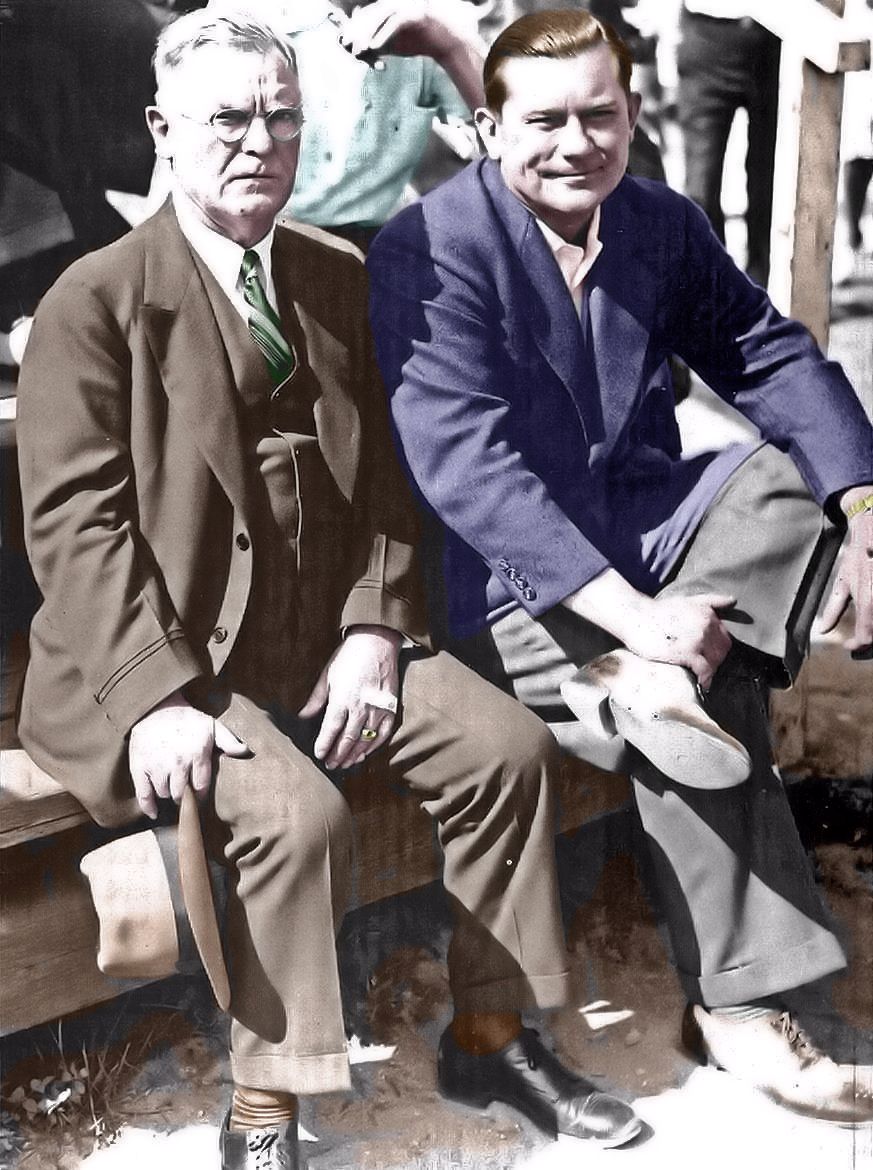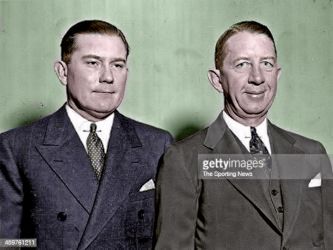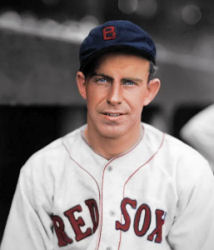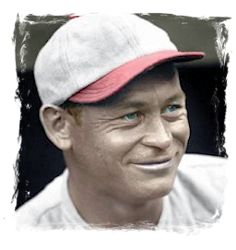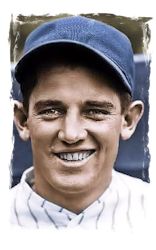|
1933 BOSTON RED SOX
The Depression had hit the Boston area very hard. That winter, the city had stopped using mechanized street plows and hired an army of workers with shovels to clear the city street. The hope was to give them a job, if only for a few days. It also hit Red Sox owner, Bob Quinn, very hard. He was burdened with the worst team in baseball and a mountain of debt. Like everyone else, he lived day-to-day, and borrowed to make payroll. He was entertaining any offer to get him out of his situation. At the 1932 World Series, Quinn ran into Eddie Collins, who arranged a meeting with Tom Yawkey, Collins' prep school buddy.
But it was hard to believe that anyone would bail him out. The Depression hit everyone and even the millionaires were short of cash. Surprisingly, at one of his frequent luncheons, Quinn announced that he had found a new owner. He had reached agreement with a young man named Yawkey, who agreed to buy the team and the ballpark for $1.25 million, a lot of money for a struggling franchise. Yawkey spoke after Quinn and promised to put the Red Sox back on the map over the upcoming years. Tom Yawkey was the son of Bob Yawkey, a lumber and mining millionaire who had owned the 1904-1907 Detroit Tigers. Tom was raised around major league ballplayers like Ty Cobb and loved the game. Bill Yawkey died in 1919, at the age of 45, leaving behind his wife and adopted son, Tom. Suddenly the 16-year-old boy was extremely rich, with a fortune estimated at more than 7 million, and perhaps as much as 20 million, dollars. (In 21st-century dollars, that was about $99 million to $283 million.) All of the money would be maintained by conservators until Tomís 30th birthday on February 21st.
Yawkey had offered to make Collins, his vice president and general manager, a promotion from his position he held with the Athletics. A's owner Connie Mack gave Collins his blessing and the ball was rolling. he Philadelphia Athletics had won the World Series in 1929 and 1930, but Mack was also in debt, and the banks were calling in his loans. He had sold Al Simmons to the White Sox. This was a perfect situation for Collins, who knew the value of the A's players, and took his position with the Red Sox, next to his friend Yawkey. Tom Yawkey took legal control of the family fortune in February, but it would be two more months however, until the sale of the Red Sox could go through. In December, Quinn dealt Hal Rhyne and Ed Durham to the Chicago White Sox for Bob Fothergill, Greg Mulleavy, Bob Seeds and Johnny Hodapp. On March 3rd, the Red Sox opened spring training in Sarasota, Florida. The team had no farm system from which to draw new players, and was largely made up of players other teams had discarded. Manager Marty McManus looked forward to the new season, feeling the team was much improved and had overcome its defeatist complex. He said he couldnít predict a finish even in the first division, but promised it would be a fighting ballclub. Yawkey arrived in camp on March 9th, and for the next five days, he and Collins sat in the stands, evaluating the Red Sox players. A fresh feeling of optimism ran through the camp, though, and a couple of weeks into training, but the Sox performed poorly in spring training and nobody thought they would be any better under new ownership. During spring training, Johnny Hodapp and shortstop Greg Mulleavy were praised for their work around the bag at second. Hodapp did his part. He was leading the league in hitting as May closed. Smead Jolley started with a dislocated finger on March 15th while catching, knocking him out of action for two weeks. It was the last time Marty McManus asked him to catch. Ivy Andrews started the spring with a bit of a handicap when been bitten by a dog while trying to break up a dog fight in Sarasota. Dale Alexander tailed off in 1933 and wound up with the only sub-.300 season of his career. Sliding into home plate on Memorial Day, Alexander hurt his leg sliding into home plate. Red Sox trainer Doc Woods used a new deep-heat method to try to reduce pain, decrease inflammation, and thereby speed healing: diathermy. Unfortunately, Woods left the machine on too long (apparently leaving the treatment room and not returning for quite some time) and burned Alexanderís leg. He was so badly burned that there was worry he might lose the leg. Fortunately, amputation was never necessary. Marv Olson spent the winter hunting wolves and coyotes along the Missouri River near his home. He was the last one to sign a contract for 1933. Thereís no indication that the Red Sox took any punitive measures, but Johnny Hodapp won the second-base slot in spring training and Olson appeared in only three April games, twice as a pinch-runner.
On their way home from spring training, in the early morning hours of April 2nd, the players were thrown out of their berths, as their train derailed and crashed in Delaware. Manager Marty McManus was active in helping other passengers from the wreckage. None of the Red Sox was seriously hurt, but the trainís engineer and fireman were killed. The Sox closed out the exhibition season beating the Braves twice, once at Fenway Park and once at Braves Field, and then beating Boston College at Fenway. But the regular season started with the Sox losing their first three games against the Yankees in New York. Hank Johnson allowed only two hits in seven innings in Washington April 17th. Roy Johnson's home run over the right field wall in the eighth inning was the difference maker, in the Sox first win of the season, 4 to 2. The next day, down 4-1, the Sox rallied with four runs of their own in the seventh inning to take the lead, winning 6-4. After losing their first two home games to the Yankees, the Sox beat the Philadelphia A's on April 23rd, 7 to 5, for their first home victory of the year. Although they lost the next game, which was a slugfest, 16-10, both Dale Alexander and Roy Johnson had three hits apiece with one of those hits being a homer for Johnson. The Sox took the final game, winning the series three games to two, but then lost six straight.
As of April folded into May, holding a record of 4-11, not once would the Red Sox ever reach the .500 mark. Pitcher, Gordon Rhodes lost his fourth straight game on May 2nd. All four of his losses were by just one run. The Sox beat the Browns, in St. Louis, on May 3rd. Smead Jolley was the star of the game, going 3-for-4 with a double and a triple. On May 9th, the sale of the Red Sox was approved at the American League spring meeting in Cleveland. To improve the Red Sox, Tom Yawkey had to either begin purchasing good prospects from the many independent minor-league teams or try to acquire or purchase productive major-league players. Yawkey, being a rich man during a time when most owners were struggling financially, chose the latter course. Immediately he announced to the other owners, that he was in the market to buy ballplayers. His unconventional behavior was seen by the other owners, as impertinent and unmannerly.
But after getting over the shock, owners started to approach him. Within minutes, Yawkey and Collins, bought pitcher Lloyd Brown and catcher Rick Ferrell from the St. Louis Browns, for catcher Merv Shea and $50K. On May 12th, pitcher George Pipgras and shortstop Billy Werber were purchased from the Yankees for $100K. On May 15th secondbaseman Marv Olson, outfielder Johnny Watwood, and a lot of cash went to the Newark Bears for outfielder Dusty Cooke. So, within days of his purchase, Yawkey had raised the level of what baseball players were worth. Like Yankee owner, Jacob Ruppert, who had taken advantage of the misfortune of Harry Frazee, to gut the Red Sox over a decade before, Yawkey was now in a position to do the same thing to all of baseball. The Red Sox scored five runs in the top of the 9th inning, in Detroit on May 14th. to win the first game of a doubleheader, 6 to 1. Newcomer Lloyd Brown shut out the Tigers, 2-0, at Fenway on May 21st. He allowed only six hits, scattered through five innings, but also had eight assists and one put-out, fielding his position. The next day, Johnny Hodapp was the star of a game which the Sox won, 3 to 2, over the White Sox. His first time up, with two outs and a runner on third, Hodapp doubled him home. His next time up found him batting with two outs and runners on first and third. He hit the first pitch into right field, driving home the Sox second run. In his last nine times up, he walked twice and hit safely the other two times, driving home six of the eleven runs the Sox had scored.
June started with the Sox in Washington, beating the Nats 7 to 5 in 13 innings. Bob Seeds' triple with a man on, brought home the winning run. After losing five straight on the road, the Sox next returned home to score a walk-off win against Washington. Down 3-2 in the ninth on June 8th, with runners on first and second, Roy Johnson doubled to bring home the tying run. After an intentional pass loaded the bases, pitcher Tommy Holmes walked Bob Seeds and Billy Werber strolled home with the game-winner, 4-3. Sox batters blasted 45 runs against the first place Yankees, winning four of the five games they played in Boston. On June 11th, they split a doubleheader, an 8 to 7 loss and an 11 to 9 win. The second game was called after six innings because of darkness. The Sox were down in that one 8-2 and got five runs in the 5th inning, went ahead the next inning and tacked on two more in the sixth and last inning. Smead Jolley had a great day with homer in the first game and went 4-for-4 in the second one, driving in four runs. Two days later the two teams played a close game with the Sox on top, 6 to 5. Dusty Cooke was the day's hero with a double and a home run, driving home four runs for the Sox. The Sox pounded out 15 hits and made them all count on June 14th, scoring 13 runs and holding off the Yanks, who scored five runs in the 7th inning, but fell short 13-5. Rick Ferrell and Dale Alexander both homered and accounted for driving in seven of the Sox runs. Marty McManus and Roy Johnson each slammed a home run in the 8th inning, which beat the Yankees 8 to 5, on June 15th. The win brought the Sox out of the A.L. cellar for the rest of the season. Bob Seeds whistled a single into left field in a 5-5 game, with the bases loaded on June 17th, to lead the Sox over the Athletics in an eight inning game. It ended a homestand that saw the Sox win five of their last six games. Rabbit Warstler contributed his only career three-run homer, an inside-the- park job on June 19th at Clevelandís League Park. With two men on, he smacked a line drive to left center and erased a 2-0 Indian lead in the 5th inning. The next day, Dale Alexander's big bat boomed the Sox, and the other hitters joined in by banging out 14 hits to beat Cleveland, 9 to 5. He cracked out three singles and a double in five times up.
Roy Johnson's two-run triple with two outs in the 10th beat the Tigers, 9-7, on June 22nd. Tiger pitcher Chief Hogsett was wild and walked both Dusty Cooke and Dale Alexander to start the inning. Tom Oliver was out trying to advance the two, when he fouled off a bunt with two strikes. Rick Ferrell popped up a pitch from Firpo Marberry who replaced Hogsett for the second out. Then Alexander hit a line drive to deep center and legged it to third. Another win the next day and the Sox had won five of their last six games. Four days later the Sox won six straight games, it gave them a 16-7 record over the previous 3 1/2 weeks. On June 26th the Sox beat the Browns, 13 to 5. Roy Johnson had three hits including another triple. The next day the Sox scored four runs in the eighth inning to beat the Browns, 5 to 4. Rabbit Warstler banged out two doubles and scored twice, while pitcher Hank Johnson allowed the Chicago White Sox four hits on the final day of June, the Red Sox winning 4 to 2. Their record for just was 15-16 and they were 16 games behind the first place Yankees.
July started still in Chicago and the Red Sox blew out the White Sox 7-2. Both Roy Johnson and Billy Werber hit home runs and had three hits. On July 2nd, the Red Sox acquired thirdbaseman Bucky Walters and Fred Muller, from the San Francisco Missions of the Pacific Coast League. The Sox stayed has hot as a firecracker, moving into Philadelphia for a July 4th doubleheader, and sweeping both games in convincing fashion for six straight wins. The first game was a one-sided 14-4 bombardment by the Sox. Rick Ferrell and Dusty Cooke each banged out two doubles and brought home five runs. Ferrell continued with a hot bat, going a perfect 4-for-4 in the second game. The Sox won this one, 9 to 1 as Ivy Andrews gave up seven hits, but made his pitches count. On July 6, 1933, the inaugural All-Star Game was played at Comiskey Park in Chicago. Babe Ruth's homer in the third inning with Gehringer on base, was the game-clincher, with the American League winning 4 to 2. Rick Ferrell caught the entire game for the AL Stars and was 0-for-3. The Sox retuned to Fenway to meet the St. Louis Browns. In the first game of a doubleheader on July 9th, George Pipgras spun a 4-0 shutout. The hitting of Dusty Cooke, who made three doubles and a single was a game highlight. Tom Yawkey also pitched a fine game against the Tigers, beating them 2 to 1, on July 11th. Then Lloyd Brown shut out the Tigers 1-0 in an 11 inning pitcher's duel with Vic Sorrell the next day, July 12th. Roy Johnson's brought Rabbit Warstler home from second with a sizzling single for the walk-off. On July 13, Roy Johnson's 11th-inning single knocked in the only run of the game, bearing the Tigers again, 1-0 at Fenway. When Cleveland and his brother Wes Ferrell played against Boston two weeks later on July 19th, Rick Ferrell homered off Wes, after which Wes homered off Bostonís Hank Johnson, marking the first time brothers on opposing teams had homered in the same game. They taunted each other about their home runs during the game and went out for a steak dinner afterwards. The Sox had a streak at the end of July, winning nine of the ten games they played at Fenway Park. George Pipgras started the streak by shutting out the White Sox on July 20th, 5 to 0. Dusty Cooke and Bucky Walters each smacked a pair of doubles the next day with the Red Sox winning 12-2. Billy Werber's two doubles helped beat the White Sox in the third game, 5-3. After taking both games of a July 23rd doubleheader, Boston completed a five game sweep of Chicago. Bucky Walters enjoyed a 5-for-10 afternoon with a home run. After the Sox and Yankees split a doubleheader, the Philadelphia Athletics came to town. On July 27th, Smead Jolley banged out four hits in four times up, including a pair of doubles in a 6 to 2 triumph. With Dale Alexander injured and Bob Seeds playing first base, Eddie Collins signed veteran firstbaseman Joe Judge, who had been released by Brooklyn, as insurance. George Pipgras won his third straight game, beating the A's and Lefty Grove, 8 to 1 on July 29th. Pipgras had won five of the six games he pitched in July and in those wins, gave up a total of just five runs. The Red Sox streak concluded their long homestand with a sweep of Philly and headed out for another road trip to start the month of August. In spite of their good play the Red Sox hadn't gained any ground on the first place Washington Nationals, starting the month 16 games behind and finishing it 16 1/2 games out.
Dusty Cooke had two doubles while Bucky Walters has a triple and blasted a home run in Philadelphia on August 7th. They gave the Sox an 8-5, win after they lost four straight. Lloyd Brown homered as part of a 3-for-4 day in Philadelphia, two days later, also pitching the Red Sox to an 8 to 4 win. The Athletics came back with the Sox to Fenway and the two teams beat each other up on August 13th. The Red Sox brought fifteen batters to the plate in the very first inning and scored eleven runs and then scored another five runs in the sixth inning. But Philly didn't quit and when the dust settled, the final score was 19-10. George Pipgras broke his arm in a freak accident while pitching against Detroit on August 14th, accelerating a premature end to his baseball career. After splitting the series in Detroit, the Red Sox proceeded to lose nine straight games in Cleveland and Chicago.
Gordon Rhodes had a great day in Chicago. however, on August 25th. He held the White Sox to one run while his fellow Red Sox, led by himself, smacked 11 hits, winning 8 to 1. Until the seventh inning, Rhodes allowed Chicago just five hits, holding them scoreless until that timed. He pounded out three hits, two singles, one of which drove in two runs, and a home run into the left field pavilion. Lloyd Brown came close to duplicating Rhodes performance the next day in St. Louis. He pitched a fine game, winning 8-1, and also was hot with his bat. He went 3-for-4, with a double and a home run, driving in five runs. Smead Jolley supported him with two doubles. Smead banged out three singles in the next game on August 27th, and Joe Judge collected four singles, that brought in four runs, leading the Sox to a 7-5 win in St. Louis. August concluded with the Red Sox demolishing the Yankees at Yankee Stadium, 15 to 2. Smead led the offense again with a double and a home run. Dusty Cooke had four hits including a double and a triple, and Rick Ferrell collected three singles. Not to be overlooked was another fine pitching performance by Gordon Rhodes. The Yanks cold only manage to touch him for six hits and two runs, both of which were unearned on a wild throw to second, trying to complete a doubleplay by Sox firstbaseman, Johnny Hodapp.
After starting September with a second straight win at Yankee Stadium, the Red Sox lost 11 of the next 12 games they played. Billy Werber stroked two doubles and a triple in a game against the Cleveland Indians on September 19th. Bob Weiland pitched a great game, limiting the Tribe to one run on six hits, until the ninth inning when he tired. The Sox ended up winning this one, 4 to 3. In his final major-league game, as it turned out, on October 1st, Smead Jolley went 1-for-5 against Babe Ruth, who decided to pitch for the Yankees. Babe pitched the complete game, winning 6 to 5, and belting his 34th homer of the year. Babe also beat Smead in a pregame fungo-hitting contest, 395 feet to 325. Suffering a serious injury on Memorial Day, by seasonís end Dale Alexander had accumulated just 313 at-bats with a .281 average. He had five home runs and 40 RBIs. Bob Seeds played 32 games in the outfield, but put in even more (41) filling in at first base after the lingering injury to Alexander. Rick Ferrell caught a career-high 137 games in 1933 and batted .297 with 72 RBIs. Roy Johnson drove his stats higher with the Red Sox as he hit .313 and drove in 95 runs. Several of his hits were game-winners. Johnny Hodapp was up with the league leaders in June and finished the year batting .312, just one point behind Johnson for the team lead. Marty McManus hit .284 in 1933, playing in 76 games at third, 26 at second base, and four at first. Billy Werber batted .258 in 427 official at-bats and swiped 15 bases to tie for fifth in the league. His 39 errors, many on throws, were still a cause for concern. It appeared to be a somewhat less adventurous year in the field for Smead Jolley, although he played in fewer games and committed only nine miscues. Percentage-wise, though, that was a decline, and his batting average fell to .282 with 65 RBIs. It was the only time in Jolleyís 20 seasons of professional baseball that he hit below .300. Gordon Rhodes was the ďaceĒ of the Red Sox staff; he was 12-15 with a 4.03 ERA, but his 12 wins were three more than anyone else on the seventh-place team. Eight of his 15 losses were by just one run. The team ERA was 4.35. Although the new players helped the Red Sox, they were more symbolic and not very substantial. The Red Sox finished seventh, only the third time theyíd not finished last since 1921. They did take four in a row from the Yankees at Fenway in mid-June, a six-game winning streak climaxing in a doubleheader sweep from Philadelphia on the Fourth of July, and winning nine out of 10 to close out July. Of course, there was also a nine-game losing streak in August and a seven-game dip in early September. Manager Marty McManus never saw eye-to-eye with General Manager Eddie Collins, and on the day after the season ended, Collins announced McManusís unconditional release.
|
